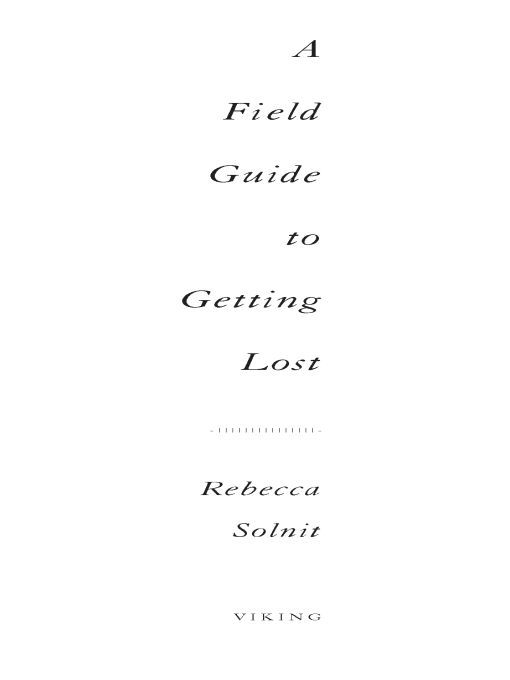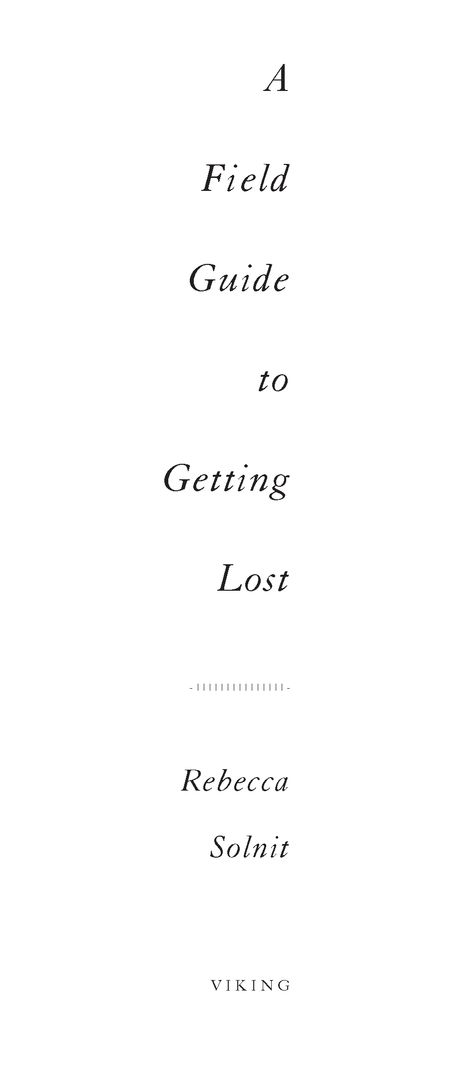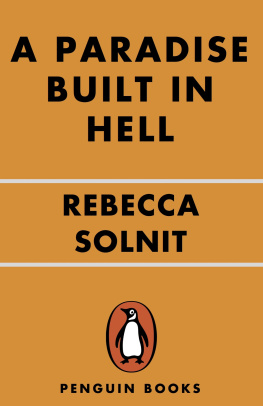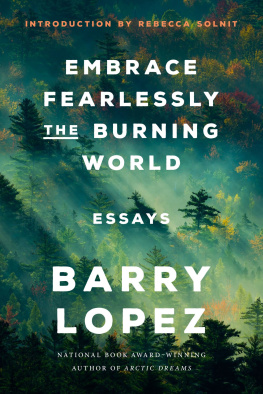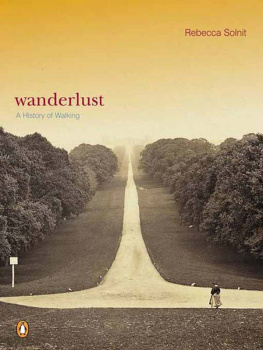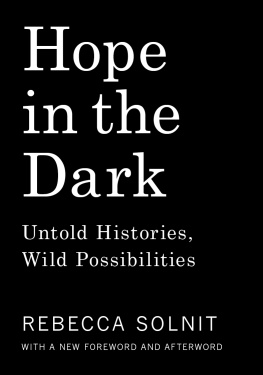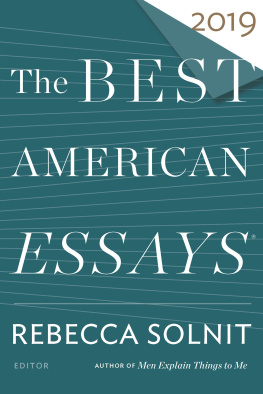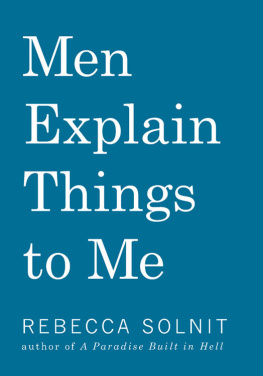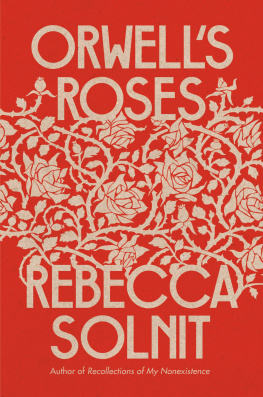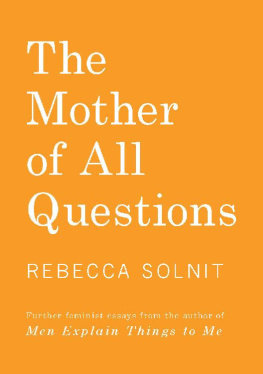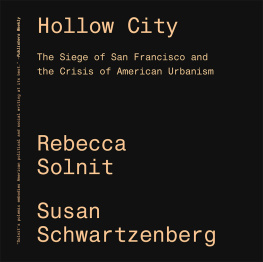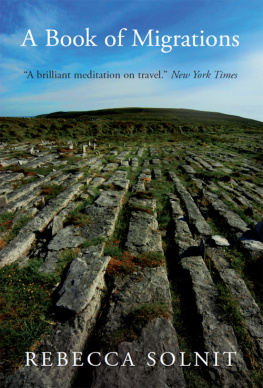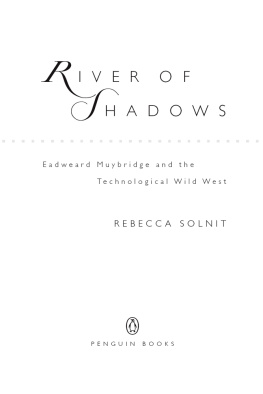Table of Contents
ALSO BY REBECCA SOLNIT
Secret Exhibition
Six California Artists of the Cold War Era
Savage Dreams
A Journey into the Landscape Wars of the American West
A Book of Migrations
Some Passages in Ireland
Wanderlust
A History of Walking
Hollow City
The Siege of San Francisco and the Crisis of American Urbanism
As Eve Said to the Serpent
On Landscape, Gender, and Art
River of Shadows
Eadweard Muybridge and the Technological Wild West
Hope in the Dark
Untold Histories, Wild Possibilities
Open Door
The first time I got drunk was on Elijahs wine. I was eight or so. It was Passover, the feast that celebrates the flight from Egypt and invites the prophet into the house. I was sitting at the grown-ups table, because when my parents and this other couple joined forces there were five boys altogether, and the adults had decided that I was better off being ignored by their generation than mine. The tablecloth was red and orange, cluttered with glasses, plates, serving dishes, silver, and candles. I confused the stemmed goblet set out for the prophet with my own adjoining shot glass of sweet ruby wine and drank it up. When my mother eventually noticed, I lurched and grinned a little, but when she looked upset, I imitated sobriety instead of tipsiness.
She was a lapsed Catholic, and the other woman a former Protestant, but their husbands were Jews, and the women thought it good to keep up the custom for the kids. So the Passover glass of wine was set out for Elijah. In some versions, he will come back to earth at the end of time and answer all the unanswerable questions. In others, he wanders the earth in rags, answering difficult questions for scholars. I dont know if the rest of the tradition was followed and a door left open for him to enter by, but I can picture the orange front door or one of the sliding glass doors into the backyard of this ranch-style house in a small valley open to the cool night air of spring. Ordinarily, we locked doors, though nothing unexpected came down our street in this northernmost subdivision in the county but wildlife, deer tap-tapping on the asphalt in the early hours, raccoons and skunks hiding in the shrubbery. This opening the door to night, prophecy, and the end of time would have been a thrilling violation of ordinary practice. Nor can I recall what the wine opened up for meperhaps a happier detachment from the conversation going on above me, a sense of limpidness in the suddenly tangible gravity of a small body on this middle-sized planet.
Leave the door open for the unknown, the door into the dark. Thats where the most important things come from, where you yourself came from, and where you will go. Three years ago I was giving a workshop in the Rockies. A student came in bearing a quote from what she said was the pre-Socratic philosopher Meno. It read, How will you go about finding that thing the nature of which is totally unknown to you? I copied it down, and it has stayed with me since. The student made big transparent photographs of swimmers underwater and hung them from the ceiling with the light shining through them, so that to walk among them was to have the shadows of swimmers travel across your body in a space that itself came to seem aquatic and mysterious. The question she carried struck me as the basic tactical question in life. The things we want are transformative, and we dont know or only think we know what is on the other side of that transformation. Love, wisdom, grace, inspirationhow do you go about finding these things that are in some ways about extending the boundaries of the self into unknown territory, about becoming someone else?
Certainly for artists of all stripes, the unknown, the idea or the form or the tale that has not yet arrived, is what must be found. It is the job of artists to open doors and invite in prophesies, the unknown, the unfamiliar; its where their work comes from, although its arrival signals the beginning of the long disciplined process of making it their own. Scientists too, as J. Robert Oppenheimer once remarked, live always at the edge of mysterythe boundary of the unknown. But they transform the unknown into the known, haul it in like fishermen; artists get you out into that dark sea.
Edgar Allan Poe declared, All experience, in matters of philosophical discovery, teaches us that, in such discovery, it is the unforeseen upon which we must calculate most largely. Poe is consciously juxtaposing the word calculate, which implies a cold counting up of the facts or measurements, with the unforeseen, that which cannot be measured or counted, only anticipated. How do you calculate upon the unforeseen? It seems to be an art of recognizing the role of the unforeseen, of keeping your balance amid surprises, of collaborating with chance, of recognizing that there are some essential mysteries in the world and thereby a limit to calculation, to plan, to control. To calculate on the unforeseen is perhaps exactly the paradoxical operation that life most requires of us.
On a celebrated midwinters night in 1817 the poet John Keats walked home talking with some friends and several things dove-tailed in my mind, and at once it struck me what quality went to form a Man of Achievement, especially in Literature.... I mean Negative Capability, that is, when a man is capable of being in uncertainties, mysteries, doubts, without any irritable reaching after fact and reason. One way or another this notion occurs over and over again, like the spots labeled terra incognita on old maps.
Not to find ones way in a city may well be uninteresting and banal. It requires ignorancenothing more, says the twentieth-century philosopher-essayist Walter Benjamin. But to lose oneself in a cityas one loses oneself in a forestthat calls for quite a different schooling. To lose yourself: a voluptuous surrender, lost in your arms, lost to the world, utterly immersed in what is present so that its surroundings fade away. In Benjamins terms, to be lost is to be fully present, and to be fully present is to be capable of being in uncertainty and mystery. And one does not get lost but loses oneself, with the implication that it is a conscious choice, a chosen surrender, a psychic state achievable through geography.
That thing the nature of which is totally unknown to you is usually what you need to find, and finding it is a matter of getting lost. The word lost comes from the Old Norse los, meaning the disbanding of an army, and this origin suggests soldiers falling out of formation to go home, a truce with the wide world. I worry now that many people never disband their armies, never go beyond what they know. Advertising, alarmist news, technology, incessant busyness, and the design of public and private space conspire to make it so. A recent article about the return of wildlife to suburbia described snow-covered yards in which the footprints of animals are abundant and those of children are entirely absent. As far as the animals are concerned, the suburbs are an abandoned landscape, and so they roam with confidence. Children seldom roam, even in the safest places. Because of their parents fear of the monstrous things that might happen (and do happen, but rarely), the wonderful things that happen as a matter of course are stripped away from them. For me, childhood roaming was what developed self-reliance, a sense of direction and adventure, imagination, a will to explore, to be able to get a little lost and then figure out the way back. I wonder what will come of placing this generation under house arrest.

